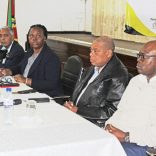Matola Provincial Hospital Maternity Unit to be closed for four months from Monday, 16th June
Bar Association human rights reports sparks polemic – AIM

File photo / Mozambican bar Association chairman Flávio Menete
The Mozambique Bar Association (OAM) on Tuesday launched its first report on human rights – and immediately came under fire for an allegedly one-sided approach.
In a section covering abuses in the country’s prisons, the report, which covers events in 2015, claimed that summary executions had taken place, but gave no source for this allegation, and cited no specific examples.
Speaking to the independent television station STV, the director of the National Prison Service (SERNAP), Eduardo Mussanhane, demanded evidence. “They speak about executions of which we have no knowledge, but, as lawyers, they know they should present proof”, he said. “When, where and how did these executions take place?”
The report also stressed the problems arising from the overcrowding in Mozambican prisons, including lack of hygiene, juvenile prisoners placed in the same cells as adults, sick inmates placed alongside healthy ones, and poor diet and medical care.
Mussanhane admitted that overcrowding does have a negative impact on the services provided to prisoners – but he claimed that a great deal of progress has been made since 2015. “They speak of lack of hygiene, but I challenge them to visit a prison, and we shall see that it is clean”, he declared.
“There is a water shortage in Maputo city, but we have water in the prisons, because the human condition of the people under our responsibility concerns us”, said Mussanhane.
Evidence of the improved hygiene, he continued, was that this year no cases of cholera have been reported from any of the prisons, including those located in cities where there have been cholera outbreaks.
The researchers who compiled the report said they had found it difficult to obtain information from some public institutions. Ivete Mafundza, the chairperson of the OAM Human Rights Commission, remarked “all reports on human rights are questioned. People don’t like to hear what is really happening”.
“We asked for information from the institutions, but the information doesn’t reach us, particularly from the police and from SERNAP”, Mafundza said. However the OAM Commission itself had visited various institutions and this first hand evidence was drawn upon for the report.
Mussanhane said he had not received any request for information from the authors of the report. The OAM, he insisted, could not provide any document showing they had requested information from SERNAP.
But OAM chairperson Flavio Menete agreed with Mafundza that it could be difficult to extract information from public institutions – even though their officials are obliged to make data public under Mozambique’s Freedom of Information Law.
“If I go to a prison and ask for statistical information about the inmates, I don’t see what difficulty the officials have in giving it to me. But they say they need authorization from their superiors”, protested Menete. “There is some fear of making available information to which citizens, by law, have a right. We must do more to publicise the law on freedom of information”.
Justice Minister Isaque Chande, who is a lawyer by profession, welcomed the report, which showed that the OAM was serious about contributing to the rule of law in Mozambique. “This also means that the OAM must contribute to the question of human rights”, he stressed.
Although he admitted that here were some cases in which the report “lacks precision”, he broadly welcomed its criticisms, reiterating that it is the function of the state to protect its citizens. Future reports could always be improved.
What was most important, said Chande, “is that reports on human rights in Mozambique should be produced by Mozambicans and by responsible institutions”.
The report did not merely criticize government institutions. It also blamed the rebel movement Renamo for “belligerent acts such as murders, kidnappings, and theft of material from government units”.
But Renamo only likes to hear about human rights when the government is being criticized, and so Ivone Soares, head of the Renamo parliamentary group, demanded the right of reply, and claimed, flying in the face of all evidence, that Renamo only launched attacks “in legitimate self-defence”.
Soares had one complaint in common with Mussanhane – she claimed that the OAM researchers had not approached Renamo to ask for information.













Leave a Reply
Be the First to Comment!
You must be logged in to post a comment.
You must be logged in to post a comment.